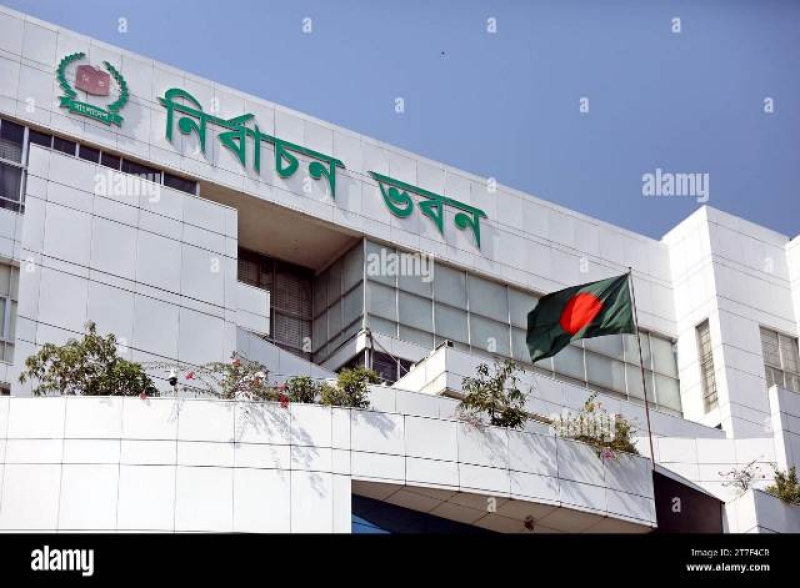- Bangladesh Plans Padma Barrage, First Phase at Tk34,608cr |
- US Expands Trump’s Gaza Peace Board, Invites More States |
- Spain Train Collision Kills 21, Leaves Dozens Injured |
- NCP Announces 27 Candidates, Aims for Seats After Exit |
- Govt Defends Prof Yunus’ Backing of ‘Yes’ Vote |
2024: A year of mass uprising that reshaped BD’s Election Commission

Election Commission
Dhaka, Dec 28 - The Election Commission experienced a tumultuous 2024, marked by a controversial national election and culminating in its reconstitution following a mass uprising that ended Sheikh Hasina's 16-year rule.
The Election Commission (EC) conducted the 12th parliamentary election on January 7 and the 6th Upazila Parishad polls in May and June.
The Kazi Habibul Awal-led commission stepped down in September and the Nasir Uddin-led commission assumed office in November.
Besides, the new interim government, led by Chief Adviser Professor Muhammad Yunus, formed two commissions to introduce reforms in the electoral arena: the Electoral System Reform Commission, headed by Dr Badiul Alam Majumdar, and the Local Government Reform Commission, led by Dr Tofail Ahmed, following the political transition on 5 August.
January 7 General Election
The Election Commission, under Kazi Habibul Awal, conducted the 12th general election on January 7, 2024, amid boycotts by several major political parties, including the BNP.
The one-sided polls attracted widespread criticism, with the election marked by low voter turnout, irregularities, the absence of strong opposition candidates, a lack of genuine voter choice, and the proliferation of proxy candidates.
The EC announced a voter turnout of 41.8%, but discrepancies between official figures and ground-level observations were evident.
As with the 2014 and 2018 controversial general elections, the 2024 election failed to gain credibility both nationally and internationally. Notably, genuine opposition parties, including the BNP, participated in the 2018 election but boycotted the polls in 2014 and 2024.
Upazila Parishad Election
The EC conducted the 6th Upazila Parishad Election in multiple phases between May and June, covering approximately 460 upazila parishads across the country. But this election was also marred by violence, irregularities and boycotts by the BNP and its allies.
City Corporation Election
The EC oversaw the Mymensingh City Corporation election and the mayoral by-election in Cumilla in March.
Formation of Reform Commissions
The interim government established the Electoral System Reform Commission, chaired by Dr Badiul Alam Majumdar, and the Local Government Reform Commission, led by Dr Tofail Ahmed.
These commissions are currently preparing reports to propose reforms to the country’s electoral and local government systems. The reform reports will be submitted to the Chief Adviser.
Resignation of the Habibul Awal-led Commission
On September 5, Chief Election Commissioner Kazi Habibul Awal and four election commissioners resigned midway through their five-year tenure, citing the political transition.
The commission, which began its tenure on 27 February 2022, faced significant criticism for its handling of the 7 January 2024 general election, controversial remarks, and inability to curb irregularities in local elections.
During the resignation announcement, Habibul Awal proposed holding general elections in phases under a non-partisan caretaker government.
He also suggested party-wise proportional representation and maximising the use of technology in elections.
In addition to the 12th national election, the Awal Commission conducted elections, including by-elections, in 992 Union Parishads, 496 Upazila Parishads, 71 Zilla Parishads, 90 municipalities, and 16 City Corporations during its tenure.
Reconstitution of the Election Commission
The interim government reconstituted the Election Commission by forming a search committee to select eligible and competent individuals for the roles of Chief Election Commissioner (CEC) and election commissioners.
On November 21, President Mohammed Shahabuddin appointed retired secretary AMM Nasir Uddin as the new CEC and four others as election commissioners. The Nasir Uddin-led commission formally assumed office on 24 November.
The four commissioners include former additional secretary Md Anwarul Islam Sarker, former district and sessions judge Abdur Rahman Masud, former joint secretary Begum Tahmida Ahmad, and Brigadier General (retd) Abul Fazal Md Sanaullah.
Upon assuming office, Nasir Uddin pledged to ensure free, fair, and credible elections following necessary reforms. He stated that holding the national election would only be feasible after implementing these reforms.
But the reconstitution of the EC before the submission of the Electoral System Reform Commission’s report drew criticism.-UNB

